So, you love body art and are considering a piercing career, but have no idea how to step into the body art industry. Not to worry, we’re here to help you get started.
The most common way to become a professional body piercer is through an apprenticeship. Why? Because this is a hands-on job and therefore you need a hands-on training. It’s also great because apprenticeships are usually modified to meet the needs of the apprentices.
Table of Contents
What is an apprenticeship exactly for?
An apprenticeship is, usually, one on one, or one on two training – mentorship program, in which someone interested in learning a craft shadows and works under an experienced person in that specific craft. It’s usually not a paid position, though in some countries they should be. Check your local laws.
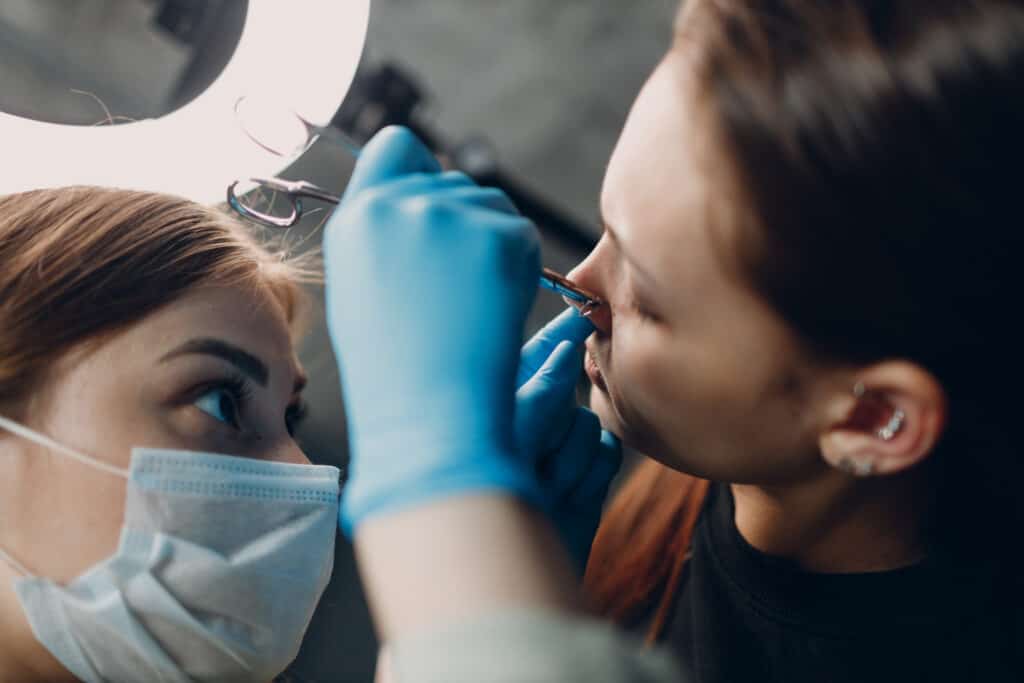
Apprenticeships aren’t only for becoming a tattoo artist or a piercer, there’s apprenticeships for becoming a plumber, electrician, etc…
They can take anywhere from 1 year to 3 years or longer and are necessary in order to ensure correct and safe practice of this profession. There are lots of procedures that need to be followed and there’s simply no way for learning them by yourself. You’re bound to make dangerous mistakes if you try. Assuming you want to become a piercer, we’d also like to assume you don’t want to become a bad one preforming unsafe piercings. So, do it the right way and get an apprenticeship.
Things to know before you start looking for an apprenticeship
Many aspiring young apprentices are naive and sometimes (often) taken advantage of when becoming an apprentice. Taken advantage of in the sense of mentors using the fact that their apprentices don’t know much about how things are supposed to go, for their own benifit. As a result to this, they end up doing free labor for next to nothing in return.
Here are some things to know before you start looking for your mentor in order to avoid this happening to you.
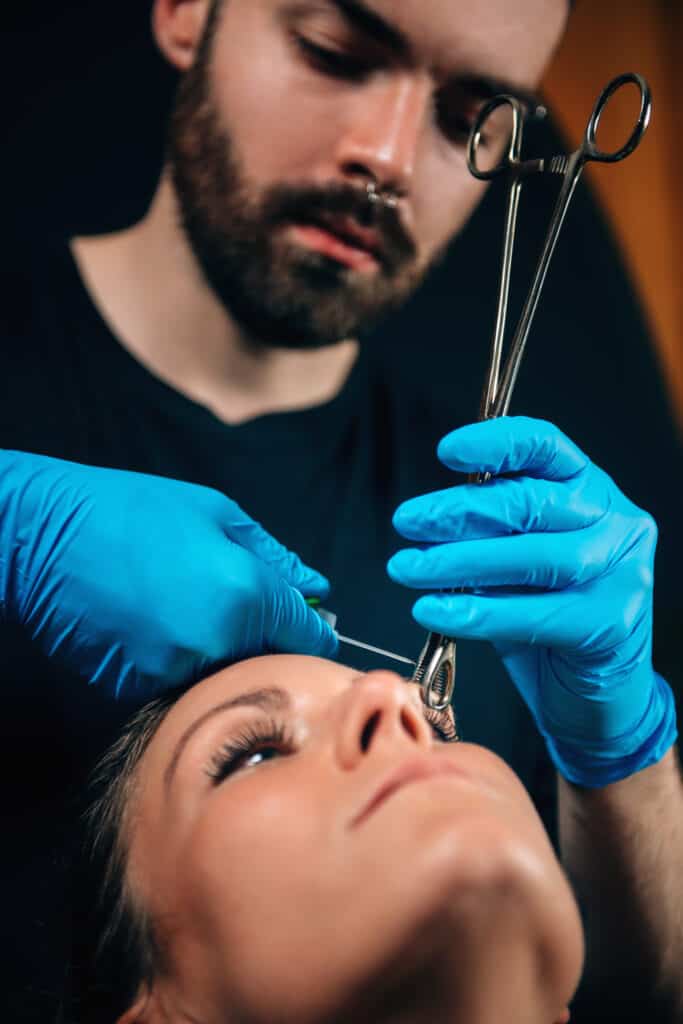
Good teachers are hard to find
Unfortunately (depending on whom you ask), good apprenticeships are hard to come by. Why? Because good and safe mentorships happen at good studios and those are hard to come by aswell.
More times than not, this profession is not taken serious. There’s lots of people who trained themselves, or tattoo artists who just saw piercing as an extra way to earn money. This said, you’ll have to find a good studio with a reputable piercer first.
Most piercers would advise you to go to a piercer with at least 5 years of professional experience. The more, the better of course. They need enough experience and time to make mistakes and learn from them before they can pass their piercing skills and knowledge onto someone else. Exceptions prove the rule, sometimes.
Apprentices also need a job once they’ve ”graduated” their apprenticeship. This means that not only does the piercer have to be an experienced professional, but the studio needs to have the clientele and the need for a second piercer. One extra reason/explanation as to why good apprenticeships are hard to stumble upon.
It makes it very competitive aswell. We can compare it to a student with a sports scolarship wanting to get into a specific, internationally famous sportsteam. Many want it, but only 1 can get it.
Who mentors you is as important to your future career as anything you’ll actually do. So, be wise when choosing and do you research!
Apprenticeships should be thorough, a bit tough, but safe
An apprenticeship is usually tough on most people. That’s also the way it should be. It is a tough job that will demand a lot from you, so, if you can’t get through the learning period, how will you get through life with a tough job?
It’s to prepare you. You’ll be in there for most of your time and will probably have to sacrifice a few things like a bit of sleep and free time. Becoming a piercer, more specifically a good one, doesn’t happen overnight or in a few weeks. It takes years of practice. They’re usually unpaid which for most people means they’ll have to take on a part-time job. So, essentially you’ll be combining two jobs.
The job doesn’t consist of only stabbing someone with a needle. These are a few things that come with the job:
cleaning and sterilization methods;
being up to date with CPR and bloodborne pathogens;
working with an autoclave;
knowing about the jewelry selection and why the materials matter;
anatomy;
talking to clients and calming them down;
helping clients with aftercare;
managing workflow;
inventory;
working with the different piercing tools…
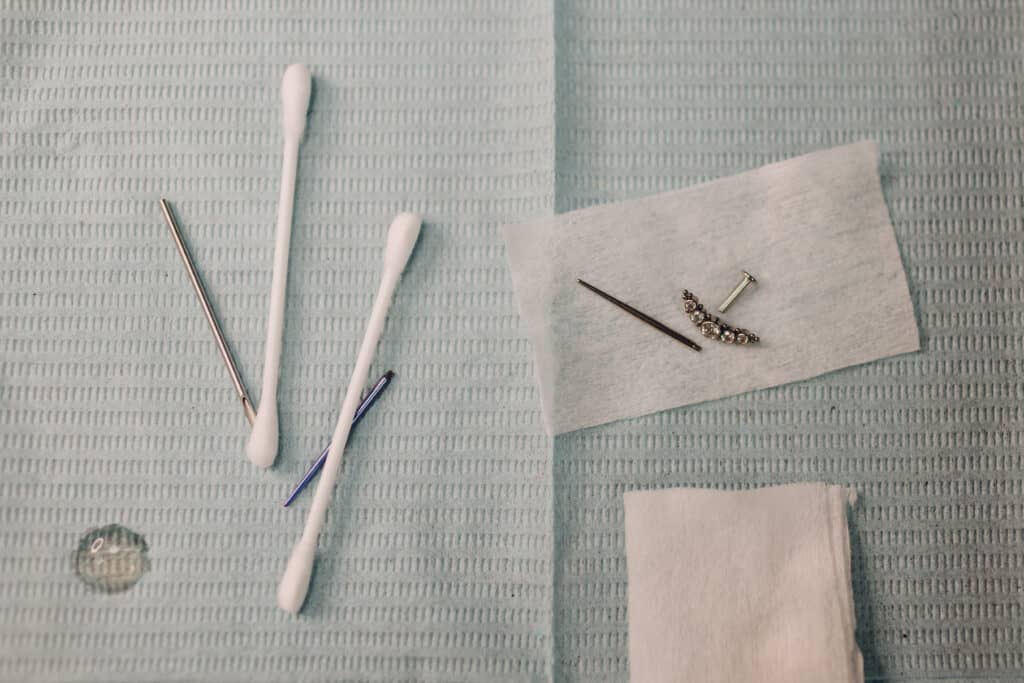
Your mentor will teach you these things first before they even allow you to touch a needle. These are less fun and exciting things to do, but necessary to learn. So, don’t settle to being rushed. It’s usually a red flag if your mentor doesn’t touch on certain topics. They should be excited to teach you and should be happy to answer your questions.
Although it is a very high demanding learning process, it shouldn’t suck the soul out of you. Yes, you’ll have to sometimes sacrifice a bit, but not all. If your mentor does expect you to give them everything and essentially be their ‘slave’, you’re not in the place you should be.
It should be a safe space. Your teacher will be tough, will tell you when you’ve effed up and they’ll be very strict. But, they should also be willing to listen to you and compromise sometimes. You don’t need to sell your soul to this person in order to learn and have a healthy mentor-apprentice relationship. Hazing is a big red flag, you don’t deserve to be hazed and this is an outdated old-school mindset.
So, how do I find/get one?
Well, once you’ve found a good and reputable studio, you must become a good client first. Unlike with tattoo apprenticeships, there’s no portfolio you can build up and bring with you to the shop and simply ask for them to teach you. This is why you have to build up a good relationship with the piercers of that specific shop first.
Option one: be a good client
Being a good client is very important. Go get pierced by this person, observe what they do. Start bringing in friends or family who want to get pierced and observe. Once you’re to the point you feel you can start asking questions about their methods, ask intellegent questions. Pay attention and try to remember as much as you can.
Promote the piercer and their shop, support them whichever way you can. This, together with asking intellegent questions, will get you noticed. Most piercers pay attention. A lot of them will realize that someday you’re going to wind up in the body piercing industry. They’ll also rather have you on their ship than on someone else’s. So, wait until they offer. You can drop subtle hints that you want to learn here and there, of course.
Option two: be persistent
If the first option doesn’t seem to work for you, you can try being persistent as well. Not with e-mails or phone calls, but in real life. Go to the shop, get pierced and be persistent with the intelligent questions AND the hints/questions about learning. Yes, this can be bothering for the piercer, but, if you can show them you’re a quality person – they’ll start appreciating it.
Present yourself in a professional manner and be tactical.
In the meantime
Landing and apprenticeship can take some time, but that doesn’t mean you should or you have to sit still until the moment arrives. There are some things you can do in the meantime to prepare yourself.
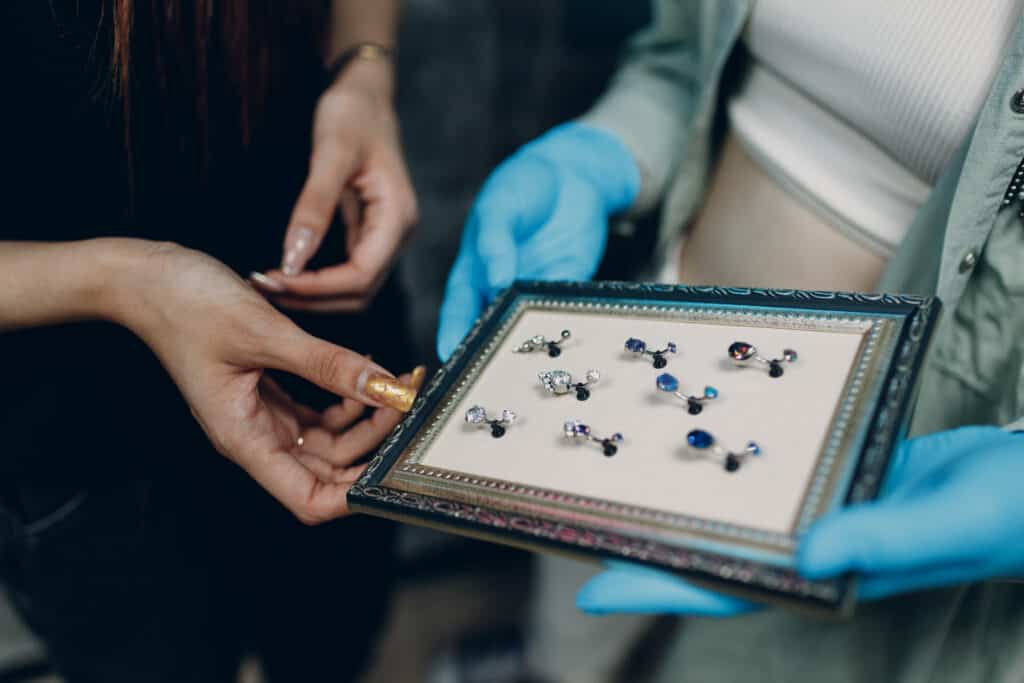
Gain the extra - related skills
As said before, the job doesn’t only consist of the action of piercing. Lots of piercers are social media managers aswell, because that is how they get their clientele and supporters. So, work on that.
Business managing is also a huge one. Knowing how to pay taxes, how to budget and manage finances will be of huge help!
Being able to take good pictures of their work also involves the skill of photography. You might want to look into this aswell.
Furthermore, they’re also artists that know about composition and color theory. This is important for designing e.g. ear jewelry and putting them all together.
The last and biggest thing you can do to prepare yourself is, get a job in the service industry. Retail or any restaurant-type of job will be of huge help, because the body art industry is also a service job. You’ll have to be able to deal with all kinds of people and know how to do so while protecting your honor at the same time. Getting a job in this industry before going all for it, will prepare you huge time.
If you can do majority of these things and commit before even having the reassurance of an apprenticeship, piercers will see you as a good candidate.
What to expect once you've landed it
Just so you can prepare yourself mentally, we’ve summed up a bit of how an average apprenticeship goes.
There’s a big chance you’ll be working front of house first. This will allow you to learn about managing a shop, communicating with the clients and learning about the business side of things. The bedside manners aswell.
It also gives you the opportunity to learn about cleaning, sterilization and skin prep. It should also be the time where you’ll have to get a CPR and a bloodborne pathogens certificate. If you’re from the US you’ll have to meet the body art specific OSHA requirement.
During this period, you’ll also be learning about body piercing tools (like surgical markers and hollow needles), body jewelry, the human anatomy.
Slowly you’ll start to learn about the piercing techniques. Your instructor shouldn’t let you perform piercings on anybody until you’ve gotten the hang of all of these elements!
Some may have you read the piercing bible aswell. It’s a book full of concrete facts and practical advice about health and safety for anyone who might want to get pierced, is pierced or wants to become a piercer. So, if you want to make it easier on yourself, do the required reading beforehand.
Once you have everything down, your instructor might let you pierce someone. Don’t expect to get paid, but if you do, count yourself lucky.
You’ll be under supervision for a while until your mentor has the confidence in you and until you have the ability to do things on your own.
A lot of piercers will have you starting out on silicone bodyparts first, though. This is so you have a better understanding about the piercing techniques, but this isn’t an optimal way of learning about placement.
There’s also a big possibility that you’ll start off with just changing clients’ jewelry, so you get used with working on someone else’s body.
FAQ
No one will force you, but it doesn’t sound like a bad idea.
APP stands for Association of Profesionnal Piercers. If you can find a certified APP piercer, we recommend you stick with them.
There are plenty of videos out there filled with piercing information for anyone to watch and learn. Just don’t trust everything you see or read online.
Do research on the piercers that post things like that and look at their track record. If they seem trustworthy, there’s no harm in learning about techniques that way. Remember though, there’s a difference between learning and practicing… Don’t practice if you don’t have an apprenticeship yet.
Most of them will see you as competition or a threat. This is another reason as to why good apprenticeships are hard to come by.
But, if you stand out , piercers would rather have you work for them than against them, so play it smart.
Most apprentices transition into full-time or part-time piercers in the studio they learned at.
Yes. Learning about the history of piercings will help you understand why they are what they are today and it’s important to be educated on your profession.
If you learn about the history, even if it’s a brief history of the piercing community, will help you stand out. This way you’ll know where body piercers ‘come from’ and it shows respect.


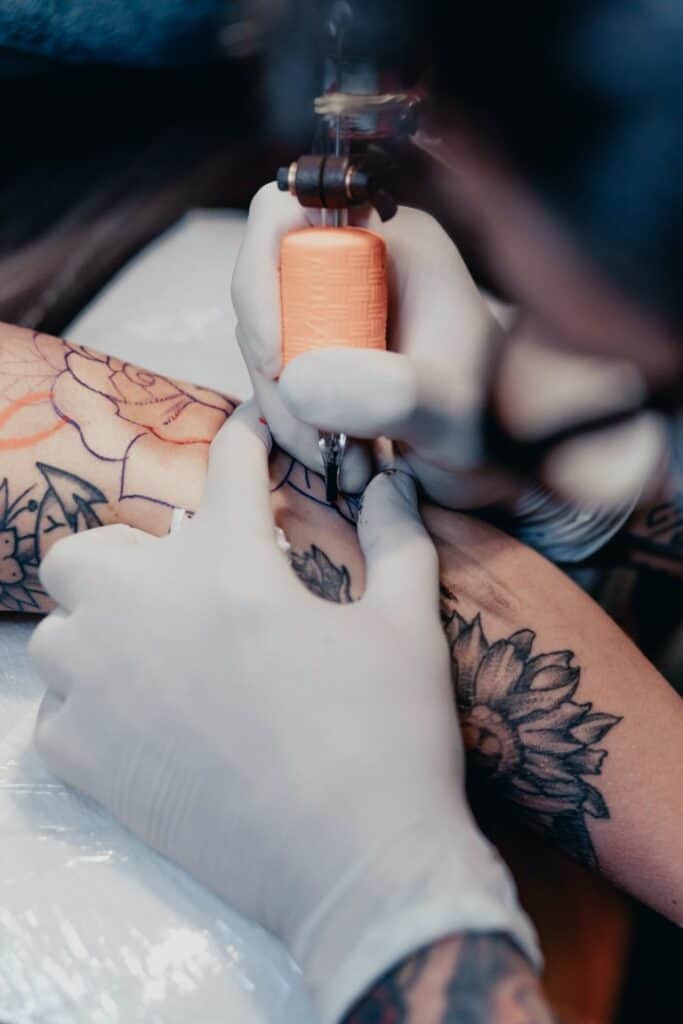
Pingback: The ultimate guide to all piercings
Pingback: Getting a septum piercing?